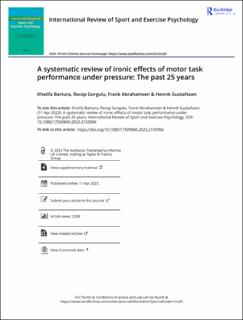| dc.contributor.author | Bartura, Khelifa Nida | |
| dc.contributor.author | Gorgulu, Recep | |
| dc.contributor.author | Abrahamsen, Frank Eirik | |
| dc.contributor.author | Gustafsson, Henrik | |
| dc.date.accessioned | 2023-10-17T07:55:32Z | |
| dc.date.available | 2023-10-17T07:55:32Z | |
| dc.date.created | 2023-04-12T12:16:44Z | |
| dc.date.issued | 2023 | |
| dc.identifier.citation | International Review of Sport and Exercise Psychology. 2023, Artikkel 2193966. | en_US |
| dc.identifier.issn | 1750-984X | |
| dc.identifier.uri | https://hdl.handle.net/11250/3096872 | |
| dc.description | This is an Open Access article distributed under the terms of the Creative Commons Attribution-NonCommercial-NoDerivatives License (http://creativecommons.org/licenses/by-nc-nd/4.0/), which permits non-commercial re-use, distribution, and reproduction in any medium, provided the original work is properly cited, and is not altered, transformed, or built upon in any way. The terms on which this article has been published allow the posting of the Accepted Manuscript in a repository by the author(s) or with their consent. | en_US |
| dc.description.abstract | Wegner's theory of ironic processes of mental control emphasizes how the implementation of cognitive load-induced avoidant instructions can cause inefficient motor cognition in sports, thereby inducing so-called ironic effects where an individual—ironically—does precisely what s(he) intended not to do. This systematic review synthesizes relevant existing research and evaluates the effectiveness of experimental manipulations and cognitive load measurements for investigating ironic effects on motor task performance under pressure conditions. This review identified twenty-four empirical studies published before January 2022, including studies with experimental (21%) and quasi-experimental (79%) within- and between-subject designs. The most common reported pressure (i.e., cognitive load) manipulations fell into two categories: anxiety (77%) and dual-task (33%) techniques. The review also identified positive action-oriented instructional interventions to reduce ironic errors. Although most reported findings supported Wegner's assumptions about ironic performance effects, the review also identified inconclusive evidence (8%), which indicates a need for more research with a greater focus on: robust experimental design; the inclusion of competitive stressors; expert athletes; elite athletes; and intervention-based studies. These additions will clarify the mechanisms of ironic effects and assist in the development of interventional programs to diminish the likelihood of ironic effects in sports performance. | en_US |
| dc.language.iso | eng | en_US |
| dc.subject | avoidant instruction | en_US |
| dc.subject | cognitive load | en_US |
| dc.subject | ironic effects | en_US |
| dc.subject | ironic processes | en_US |
| dc.subject | mental control | en_US |
| dc.subject | pressure performance | en_US |
| dc.title | A systematic review of ironic effects of motor task performance under pressure: The past 25 years | en_US |
| dc.type | Peer reviewed | en_US |
| dc.type | Journal article | en_US |
| dc.description.version | publishedVersion | en_US |
| dc.rights.holder | © 2023 The Author(s) | en_US |
| dc.source.pagenumber | 40 | en_US |
| dc.source.journal | International Review of Sport and Exercise Psychology | en_US |
| dc.identifier.doi | 10.1080/1750984X.2023.2193966 | |
| dc.identifier.cristin | 2140265 | |
| dc.description.localcode | Institutt for idrett og samfunnsvitenskap / Department of Sport and Social Sciences | en_US |
| dc.source.articlenumber | 2193966 | en_US |
| cristin.ispublished | true | |
| cristin.fulltext | original | |
| cristin.qualitycode | 1 | |
